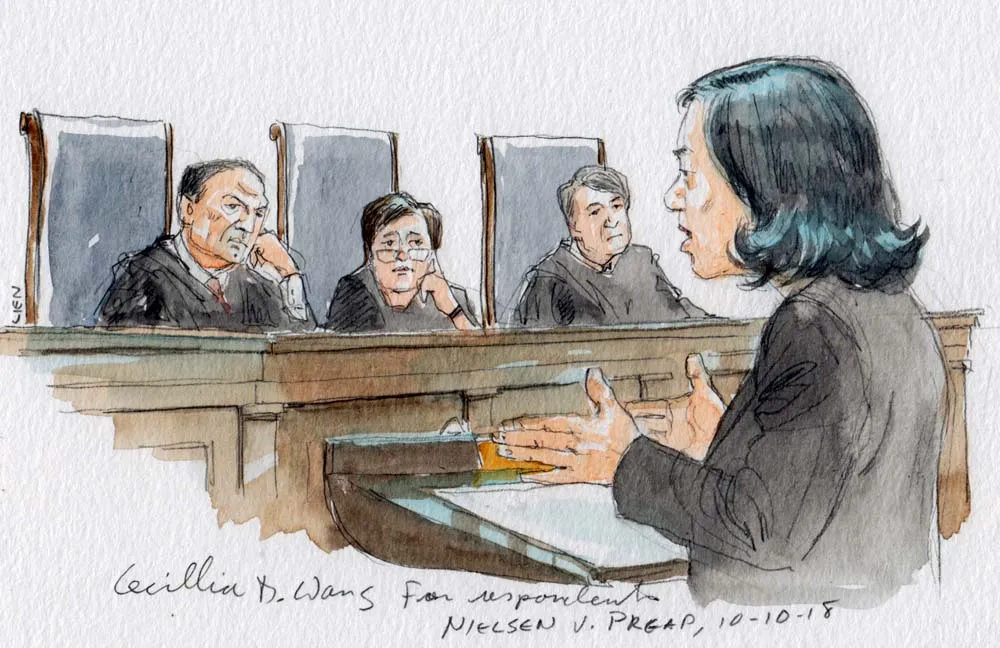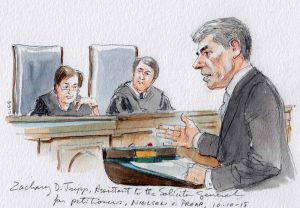Argument analysis: Are there limits to the governments power to detain immigrants without a hearing?

On Wednesday, the Supreme Court heard oral argument in the case of Nielsen v. Preap, which involves a challenge to the governments interpretation of one of the Immigration and Nationality Acts detention provisions: 8 U.S.C. 1226(c). The relevant portion of 8 U.S.C. 1226(c)(1) states that the secretary of the Department of Homeland Security shall take into custody any alien who [is inadmissible or deportable on certain specified statutory grounds], when the alien is released, without regard to whether the alien is released on parole, supervised release, or probation, and without regard to whether the alien may be arrested or imprisoned again for the same offense. Mony Preap and a similarly situated class of immigrants challenged the governments application of this mandatory detention provision to individuals whom Immigration and Customs Enforcement does not detain at the time they are released from criminal custody.

Zachary Tripp, representing the government, argued that the key provision at issue in the case is 8 U.S.C. S 1226(c)(2), which deals with the circumstances under which an individual otherwise subject to mandatory detention under Section (c)(1) may be released. His attempt to frame the interpretation of the statute in this way was greeted with immediate skepticism from Justice Sonia Sotomayor, who asked him what meaning the government gave to the when released language of Section (c)(1). So you dont see any sense of urgency in your acting, no sense of encouraging you in some way to actually do what the statute says? she pressed. She noted that, at the time the statute was enacted, Congress also enacted a two-year transitional rule that would allow for a ramping-up period leading to the mandatory detention regime now in place. Why did you need that two-year period if, in your view, you have absolute discretion … to pick up an alien whenever you want anyway? Tripp responded that the government understand[s] this to be a continuing and urgent obligation to arrest them right now, but did not concede that the statutes authorization of detention is tied to fulfilling that obligation.
Sotomayors questions highlighted continuities between this case and Pereira v. Sessions last term. There, too, the statutory provision in question could be read to create congressionally required obligations on the government, imposed because of Congress frustration with the (then) Immigration and Naturalization Services inefficiencies in enforcing immigration law. In Pereira, the Supreme Court held that the governments obligation was to serve a notice to appear that contained the date of appearance. In yesterdays case, Preap argues that the congressionally mandated procedure is to apprehend individuals released from criminal custody immediately upon their release. In this case as in Pereira, the governments argument attempts to reframe this obligation as a charge to do its best, while imposing on immigrants the full burden of the statutory scheme.
That approach did not succeed in Pereira, and the questioning from Justices Elena Kagan, Ruth Bader Ginsburg and Stephen Breyer strongly suggested that they do not think those arguments should succeed here, either. Kagan at one point told counsel, I look at the (c)(1) custody authority and its all about criminal custody and what happens when youre released from criminal custody, and that makes me think that your interpretation of the words described in paragraph 1 is wrong.
Breyer noted the parade of horribles that are already occurring under the governments interpretation. Immigrants who have been deeply reintegrated into their communities for many years are suddenly being taken into detention and detained without a hearing for very long periods of time. Breyer clearly signaled that an interpretation of the statute that allows for this raises serious constitutional questions. He also pushed back on the governments analogy to criminal cases that hold that a missed bail-hearing date requires the government to hold a bail hearing, not to release a detained immigrant immediately. In this case, Breyer pointed out, the governments missed deadline results in the indefinite detention of immigrants without a hearing — it does not have the same legal effect as in the bail cases. In fact, Preaps reading of the statute is the one that results in a hearing. Breyer noted that the governments interpretation of the statute is not necessary to prevent the baddies from wreaking harm in the community or missing their court dates because individuals not detained when released under Section 1226(c)(1) can still be detained if that is found to be appropriate after a hearing under Section 1226(a).
Ginsburg wanted help from counsel for Preap, the ACLUs Cecillia Wang, in understanding the anomalous idea that someone taken into immediate custody would be denied a hearing, but someone detained later would receive a hearing. Wang responded that Congress chose its words and drew bright-line rules in the detention statute. (It is clear from the Supreme Courts decision in Demore v. Kim concerning the same provision that those rules can be constitutional even when they do not make much practical sense.)

Justice Samuel Alitos questions indicated the same sympathy with the governments claim as he manifested in his dissenting opinion in Pereira. As in that case, Alito suggested with his questions that Congress view in 1996 was that [i]f youre an alien, you come here, you commit one of these crimes, youve effectively forfeited whatever right you have to remain at large in the community. His questions, along with his past decisions, made clear that Alito does not feel there is a constitutional liberty interest at stake that would raise concerns about the governments interpretation of the statute. It is safe to conclude that the silent Justice Clarence Thomas shares this view of the case, based on Thomas past votes in cases raising similar issues.
Justice Brett Kavanaughs questioning also telegraphed clear support for the governments position. He hypothesized that Congress knew that immediate detention would be impossible in many cases, and yet Congress did not put a time limit, which raises a real question whether we should be superimposing a time limit into the statute when Congress, at least as I read it, did not itself do so. In characterizing Congresss intent in passing the 1996 laws, he stated that what was really going through Congresss [mind] in 1996 was harshness on this topic. In a colloquy with Kavanaugh, Wang attempted to show that the statute does indeed have a time frame imposed by Congress detention immediately upon release arguing that when meant what when means in the common sense. But Kavanaugh did not appear convinced. Nor was he convinced that discretionary detention with a bond hearing was sufficient for the class of immigrants whose offenses are enumerated in Section (c)(1), because Congress was concerned that those hearings were not working the way that Congress wanted. Wang conceded that was true, but only for the class of individuals identified in (c)(1); she emphasized that Preaps whole argument is that he falls outside of that category.
Although retired Justice Anthony Kennedy voted against the government in Pereira and might therefore have been expected to do the same here, his replacement by Kavanaugh may not determine the outcome in this case. Both Chief Justice John Roberts and Justice Neil Gorsuch also came down on the side of the immigrant in Pereira. It is not yet clear where those two justices stand on this case. But an entertaining exchange between Gorsuch and Wang about grammar (in which Wang won kudos from the justice) suggested that Gorsuch has at least some sympathy for Preaps statutory construction argument, even if he is not yet completely convinced. And when Gorsuch pressed Tripp on whether there were any limits on the governments power under the governments reading of the statute, it was reminiscent of the concerns about government overreach that Gorsuch signaled last term in Sessions v. Dimaya, in which he also came down in favor of the immigrant.
Roberts searched for guidance from Wang about whether when released should be interpreted to mean within a reasonable degree of immediacy after release or within a reasonable time, to which Wang replied that it should be interpreted to mean a reasonable time, regardless of the nature of the governments efforts. She pointed to precedent from the Board of Immigration Appeals indicating that 48 hours would be too long and advocated that the appropriate time frame would be within a day of release. Roberts questions suggest that he may believe that the mandatory detention provision is more limited in scope than the governments argument suggests and that he is searching for the appropriate temporal limit to the mandatory detention requirement of Section (c)(1) in cases like Preaps.
Posted in Merits Cases
Cases: Nielsen v. Preap
